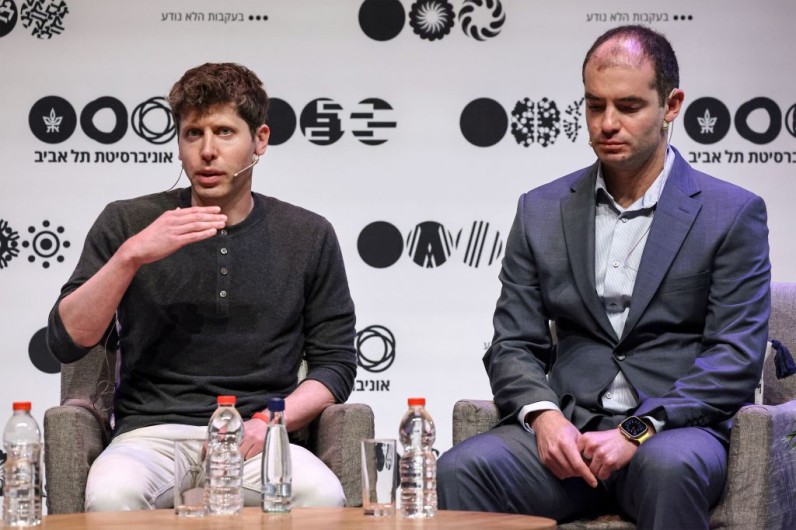
Ilya Sutskever, co-founder and chief scientist of generative artificial intelligence company OpenAI, announced Tuesday (May 14) that he was leaving the company, saying on X, formerly Twitter, that he wanted to venture into a "personally meaningful" project without elaborating further.
After almost a decade, I have made the decision to leave OpenAI. The company’s trajectory has been nothing short of miraculous, and I’m confident that OpenAI will build AGI that is both safe and beneficial under the leadership of @sama, @gdb, @miramurati and now, under the…
— Ilya Sutskever (@ilyasut) May 14, 2024
Jakub Pachocki, the company's research director, will replace Sutskever as chief scientific officer. Sutskever's departure came a day after OpenAI launched its newest AI model, ChatGPT-4o, which the company claimed was "much faster" than its previous iterations.
CNBC reported that the announcement also came months after OpenAI underwent a leadership crisis involving co-founder and CEO Sam Altman.
In a response tweet about Sutskever's exit, Altman said that he was "sad" to see him go, calling him "a guiding light of our field" and "a great friend." Altman's statement was also reposted on OpenAI's website.
Before OpenAI, Pachocki obtained a PhD in theoretical computer science from Carnegie Mellon University, and was heavily involved in further developing the company's generative AI tool, ChatGPT.
Ilya and OpenAI are going to part ways. This is very sad to me; Ilya is easily one of the greatest minds of our generation, a guiding light of our field, and a dear friend. His brilliance and vision are well known; his warmth and compassion are less well known but no less…
— Sam Altman (@sama) May 14, 2024
Altman-Sutskever Rift
The November coup centered on OpenAI's board claiming that Altman was not "consistently candid" in communicating with them. The Wall Street Journal reported at the time that Sutskever told Altman that he was fired after an alleged dispute regarding the Microsoft-backed company's approach to AI.
It was revealed at the time that Altman was eager to push ahead with delivering new technology, while Sutskever's pushback was about ensuring that AI would not harm humans.
An employee counter-coup reinstated Altman from the board, and as a result, Sutskever, Helen Toner, and Tasha McCauley were dismissed from the OpenAI board. Adam D'Angelo was retained on the board despite voting to kick Altman out.
The three were replaced by former Bill and Melinda Gates Foundation CEO Dr. Sue Desmond-Hellmann, former Sony Entertainment president Nicole Seligman, and Instacart chair and CEO Fidji Simo.
When asked about Sutskever's status at OpenAI, Altman told reporters on a Zoom call that there were no updates to share, saying that he still looked forward for him and Sutskever to "work together for the rest of [their] careers."
READ NEXT : OpenAI Introduces ChatGPT-4o; New Smarter, Faster Chatbot Scarily Translates, Flirts, and Teaches Humans!
Cleaning the OpenAI House
In March, Open AI announced its new board, which included former Salesforce co-CEO Bret Taylor, who would also chair the OpenAI board, and Clinton administration treasury secretary Larry Summers. Microsoft also has a seat on the board as a non-voting observer.
With Sutskever's dismissal and subsequent exit, Altman and OpenAI president Greg Brockman are the only company co-founders sitting on the board.
The company also completed an internal investigation into how and why the OpenAI board coup happened, with the help of US law firm WilmerHale.
Altman and Tesla CEO Elon Musk principally co-founded OpenAI. The two hired Sutskever, then a Google research scientist, to become its founding chief scientist.
Musk filed a lawsuit against OpenAI last March, which detailed Sutskever's initial hesitation in accepting the role. At the time, Musk was also curious about Sutskever's fate in the company after he was removed from OpenAI's board.
The New York Times and The Verge also confirmed that another OpenAI employee named Jan Leike has resigned from the company, with speculations that his duties, including the leadership of the company's Superalignment team, would fall under another pro-Altman co-founder, John Schulman.
I have immense gratitude to Ilya for being my co-founder, my friend, and the officiant at my civil ceremony.
— Greg Brockman (@gdb) May 14, 2024
Together, we charted the path of what OpenAI would become today. When we started in late 2015, OpenAI was a non-profit with a mission to make AGI go well but without a… https://t.co/4HEm6EDtqb







Join the Conversation